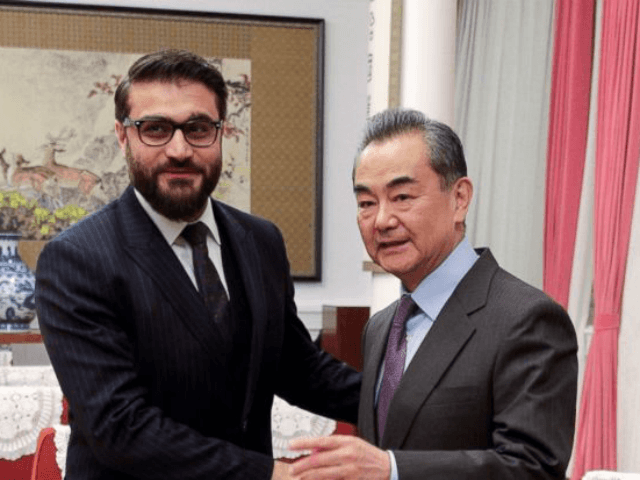Afghanistan’s national security adviser arrived in Beijing on Thursday to discuss bilateral security cooperation between his home country and neighboring China as well as Kabul’s U.S.-backed peace negotiations with the Afghan Taliban.
Citing a statement from Afghanistan’s Office of the National Security Council (ONSC), Khaama Press (KP) reports that the foreign minister of China for Asia and the acting Afghan Ambassador in Beijing received National Security Adviser of Afghanistan Hamdullah Mohib.
Mohib told Chinese Foreign Minister Wang Yi Afghanistan is seeking to “bring some long-term stability to our region,” the Associated Press (AP) reveals.
Wang reportedly stressed the “mutual understanding and mutual support” the countries have offered each other and China’s backing of efforts to “promote domestic peace and political reconciliation in Afghanistan.”
“At such an important moment, we know you have been entrusted by [Afghan] President Ashraf Ghani to pay this visit to enhance mutual understanding and coordination. We think this is highly timely and necessary,” Wang added.
Mohib will reportedly spend two days in Beijing.
Afghanistan’s national security office acknowledged Mohib is expected to discuss “bilateral security cooperation, Afghan-led peace process, and strategic cooperation between China and Afghanistan,” with China,” KP notes.
This month, Mohib visited India, considered a regional rival by strong allies China and Pakistan. India has provided economic aid to Afghanistan.
Despite pressure from Saudi Arabia, the United Arab Emirates, and Pakistan, the Taliban has refused to participate in direct negotiations with the Afghan government — considered illegitimate by the terrorist group.
Pakistan, Saudi Arabia, and the UAE are the only countries to officially recognize the Taliban regime before U.S. troops removed it from power in Afghanistan in late 2001.
The Taliban, which considers itself the legitimate government of Afghanistan, is trying to establish strict Islamic laws, or sharia, across the country.
Taliban terrorists, who generate most of their funding from the illicit heroin business, control or contest about 45 percent of Afghanistan, according to a U.S watchdog agency.
The Trump administration has suspended billions in funding for Pakistan over Islamabad’s refusal to take action against the Haqqani Network and Taliban terrorists killing and maiming U.S. troops and their Afghan allies.
Umer Daudzai, Afghan President Ghani’s special envoy, is currently on a four-day visit in Pakistan to discuss the Afghan peace process with government officials as well as political and religious leaders, TOLO News reports.
Pakistan took credit for the most recent meeting between the U.S. and the Taliban in Saudi Arabia. The Taliban this week canceled a follow-up meeting over “agenda differences,” particularly the involvement of Afghan officials.
Uighur (or Uyghur) Muslim-majority Xinjiang, China’s largest province, borders several predominantly-Islamic nations, including Afghanistan and Pakistan-held Kashmir, a region claimed by Bejing, New Delhi, and Islamabad. Some Uighurs have joined jihadis affiliated with the Afghan Taliban and al-Qaeda who operate in the Afghanistan-Pakistan region, home to the highest concentration of terrorist groups in the world.
Jihadis from al-Qaeda and the Islamic State (ISIS/ISIL) have threatened to attack China. Beijing has sparked an international outcry for forcing hundreds of thousands of mainly Uighur Muslims into concentration camps China claims are only vocational and educational centers aimed at combatting terrorism and religious extremism.

COMMENTS
Please let us know if you're having issues with commenting.